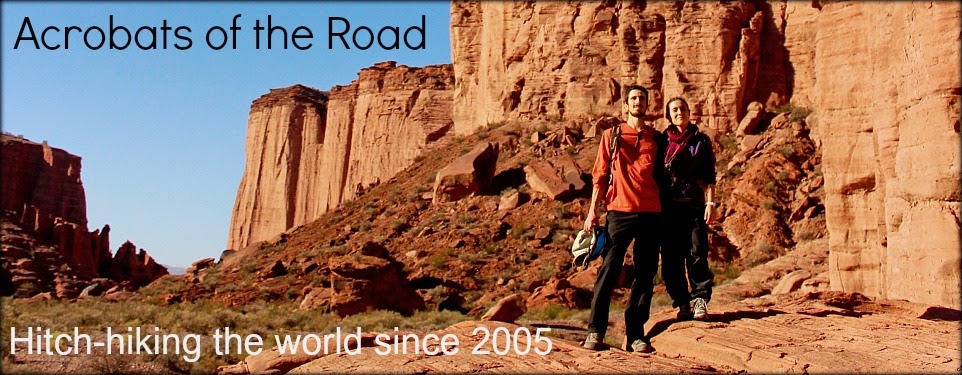While sirian diplomats processed our passports and stamped nice marks with appealing arabic scriptures (even a dental paste advertisment in arabic evoques charming tales of cruzaders and deserts) Verónica and I were hitch-hiking to Lewes, a small town in County Sussex, to the South of London. We had to go back to collect our passports the following week. Small town, but relevant: we are 40 kms from Hastings, where in 1066 the normans of William the Conqueror hit, only record in history of a succesful invasion to England. Not only the normans succeded in what Napoleon and Hitler were to fail, but defeating the saxon tribes they set the base for the modern English state. The name Great Britain is a synthom: Britain is the name of a french province west of Normandy. Time passed and the conquerors started to speak the language of the defeated. But they let their mark, and thus so many english words with latin base.
Getting to the outskirts of London to hitch-hike took 4 hours. Once in the motorway we started a fragmentated and uninteresting trip, and three drivers later we were in Lewes in the Lanesdown’s Arms, our friends local pub. We had to wait for them. We sat an our language called the attention of Brian, a very particular local. The south of Britain is famed for been a pocket of old hippies as wells as for having the strange combination of rocketed prices and people living from social security. Some of the old timers fell in this category. Brian had hitch hiked trough Europe in the early 80s. It seems that when in Crete, in a crowded house where 20 people of 15 different nationalities were living, he met an argentinian traveler. It was april 1982. The guy said: “Fuck Galtieri!”. He replied: “Fuck Tatcher!” and they went on well since then. Brian thanked us many times for being in his time. It was clear we reminded him of his past and he was glad to see that some people still wander around the planet with the thumb out. He had even offered him his house for the night when our friends Una and Duncan turned up.
Duncan assured he was the best criquet player in his town, and to demostrate this he invited us to a match the following day in which two traditional pubs of town were playing each other. For those of us used to the speed of soccer criquet is something of a cultural shock. Not only for being slow, but also for the rituals added to the sport. When I asked Duncan when was the match to start he replied: “When the beer is finished”. So it didn’t seem we were to see a parade of british accuracy. We got there, and it was the image of an updated victorian picnic. The players friends were opening bottles most of which were downed by the players themselves. Half an hour later we realized the match had already started. At moments people were clapping, but for those ignorant of criquet rules it was impossible to know why they did so. There were no obvious scores and players run without clear directions. Criquet is even more popular in India and Pakistan, product of course of british colonization. I asked Duncan (who is teacher of history) if didn’t think of it as a tsample of genuine british trade, taking all natural resources and leaving in exchange a sport or two. “yes, -he answered- and as I see it, we are still waiting for the change”. Sorprise came when one of the teams was a player short and they invited Veronica to play (naturaly, the team was wining for enormous difference). Thay clapped each time she failed.
We can’t complain about the hospitality in Duncan’s parents house, altough the coronation-jubilee tea cups decorating the kitchen made it clear they were gonna be upset when the sicilian wine spilt on the carpet, hand made and winnner of I don’t know what exhibition. They day after the incident we set off hitch hiking with Demian, a friend of us, towards Arundel, where we camped for 2 days. Then we continued to Wales, or so we believed. First a Volkswagen van took us to Southampton. There we hitchhiked in the motorway, Vero had the peace flag rolled as a skirt. Within 5 minutes a police car showed us the way to a service station… There it was another Volks van. The driver, Sam, was an official of the Royal Navy who had bought the van 2 hours before and was going home in Plymouth, not far from Cornwall, so we made Cornwall our goal. Sam had been to the Gulf War and also in Afganistan. He is yet another member of armed forces in giving us lifts. They all seem to be able to separate their consciusness from their professional duties. Sam told us that in Plymouth there was a protest against the war. According to him they were all lawyers from London, smart people who don’t know what to do in their free time, so they cause trouble. So, in that delivery of destiny we arrived to Ivybridge, a small town in the border of Dartmoor National Park.

No comments:
Post a Comment